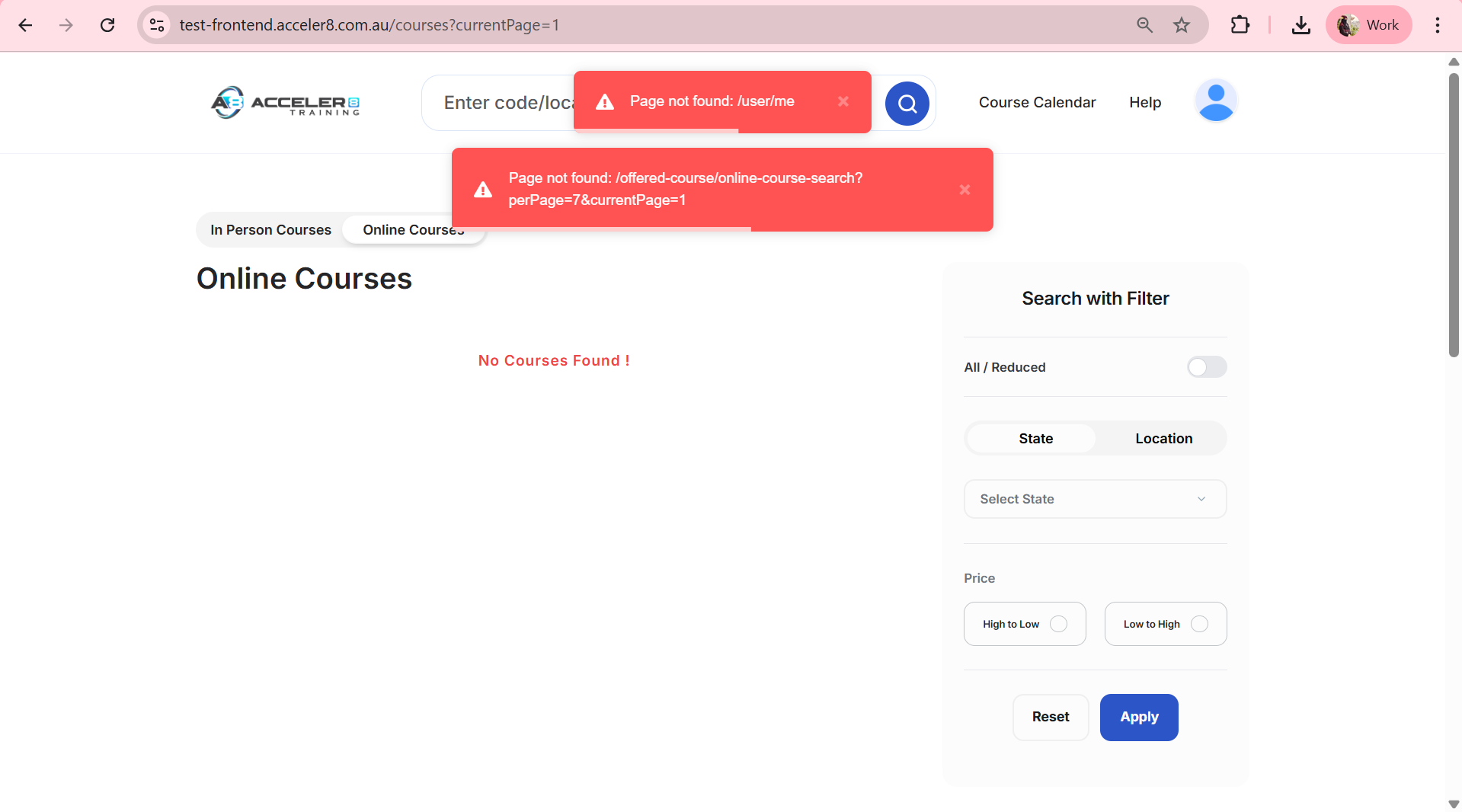Work Safely at Heights + Height Safety Equipment Inspector
Course code: RIIWHS204E + PUAEQU001
 RTO Tester01
RTO Tester01
At a Glance
- Course code: RIIWHS204E + PUAEQU001
- Duration: 1 day
- Start: 09-09-2025
- Training Location: Brisbane
Overview
Course Overview
Title: RTO Course Creation, Scheduling & Approval Journey on A8 Platform
Purpose:
To enable Registered Training Organisations (RTOs) to create, configure, schedule, manage, and (when required) re‑enable courses so they can be approved by A8 Admin and published for learners (including handling online and multi-day variants).
Target Users:
1. RTO Course Creators / Coordinators
2. A8 Platform Administrators (Approval & Oversight)
3. Corporate Users (requesting private run courses)
4. Students / End Customers (indirect beneficiaries)
Core Objectives:
- Provide a streamlined interface for creating accredited and non-accredited courses.
- Allow flexible scheduling: single-day (with optional multiple schedules per day), multi-day ranges, and online (no date-bound) offerings.
- Support bulk application of time, pricing, and seat data across multiple selected dates—while still allowing per-date overrides.
- Facilitate lifecycle actions: create → approve → edit → phase out → re-enable.
- Ensure governance: A8 Admin approval before public visibility.
- Enable corporate request workflow for private training (manual relay in current phase).
- Maintain auditability and readiness for pricing, seat management, and notifications (email flows).
Key Features (Current + Phase 3 Enhancements):
1. Course Creation Form:
- Mandatory fields: Name & Description, Course Type (accredited / non_accredited / online), Course Code (unique), Categories, Course Title, Training Location (includes fixed “Online”), Course Fee, Certification, Tag(s).
- Optional fields: Overview Description, Outline, Government Grant flag, GST flag, Allow PO flag, Cover Image.
2. Advanced Scheduling (Calendar Function Upgrade):
- Multi-selection singular day mode: pick any number of independent dates (single clicks; click again to deselect).
- Multiple-day range mode: pick start date (click 1) + end date (click 2) to define a continuous span.
- Apply once: start time, end time, price, seat limit propagated to all selected dates.
- Optional: create multiple schedules within a single day (add schedule rows; can repeat across all selected dates).
- Editing modes:
- Master edit (change all selected dates with confirmation).
- Singular date edit (override price, seat, or schedule for one date).
3. Online Courses:
- Selecting Training Location = Online disables calendar scheduling.
- Always discoverable in search regardless of date filters.
- Tracked in sales, earnings, and disbursement metrics.
4. Editing & Re-Enabling:
- Edit journey pre-populates all data; calendar shows existing dates.
- Ability to add future dates (pre-populates last known config).
- Per-date vs all-dates modification controls (e.g., “edit singular date” vs “apply to all”).
- Re-enable phased-out/completed courses via similar flow.
5. Cancellation & Booking Adjustments (Student Management Side):
- Edit student details (name, contact, PO) with notification emails (student, RTO, A8 Admin).
- Cancellation allowed until 3 business days before start; seat returned to availability.
6. Corporate Private Run Requests:
- Form captures: competency needed, number of students, desired location, desired date.
- Routed as email to A8 Admin (manual onward distribution in current phase).
- Access likely from corporate user profile tab (login required).
7. Approval Workflow:
- Post-launch status: pending until A8 Admin approves.
- Approved courses become searchable and purchasable.
High-Level Flow:
1. RTO logs in → Create Course.
2. Enters core details → Saves internally.
3. Selects schedule mode (single-day multi-select / multi-day range / online).
4. Applies time, price, seat (and optional multiple schedules).
5. (Optional) per-date overrides.
6. Preview → Launch (submission).
7. A8 Admin reviews → Approves.
8. Course visible to end users (search / listing).
9. Lifecycle: Edit / Phase Out / Re-enable as needed.
10. Purchases generate emails & dashboard/accounting updates.
Data Sensitivities & Validation Focus (for SQA):
- Unique course code enforcement.
- Mandatory tag assertion (at least one tag).
- Calendar selection integrity (no duplicate or invalid date states).
- Propagation logic: ensure master changes don’t unintentionally overwrite singular overrides without confirmation.
- Online course exclusion of scheduling UI.
- Seat limit & pricing consistency after edits, cancellations, or re-enablement.
- Email triggers (create, edit student, cancellation, purchase online).
- Access control: Only RTO can edit its courses; only Admin can approve.
Success Metrics (Implicit):
- Reduced time to configure multi-date courses.
- Fewer redundant schedule entries.
- Accurate reflection of edited price/seat per date.
- High approval throughput (minimal rejections due to missing mandatory info).
Sample Course Overview Description (Template You Can Use in the UI):
This course provides participants with the essential knowledge and practical structure needed to configure and publish training offerings on the A8 platform. It covers course definition, flexible calendar scheduling (single-day, multi-day, and online), multi-schedule per day handling, capacity and pricing controls, lifecycle management (edit, phase out, re-enable), and administrative approval workflows.
If you intended a shorter Course Overview text specifically for the “Course Overview Description” field, here is a concise version:
Learn how to create, schedule, and manage accredited or non-accredited courses on the A8 platform, including multi-date selection, bulk schedule application, per-date overrides, online delivery setup, and the full approval journey.
Need a different angle (marketing style, technical spec style, or SQA test scope)? Just let me know.
Outline
Dummy Course Outline (Test Data)
Course Title:
Introduction to Software Testing
Course Code:
ST-101
Duration:
6 Weeks (12 Sessions, 2 per week)
Instructor:
John Doe
Module 1: Basics of Software Testing
Lesson 1.1: What is Software Testing?
Lesson 1.2: QA vs QC vs Testing
Lesson 1.3: SDLC vs STLC
Module 2: Testing Types
Lesson 2.1: Smoke, Sanity, Regression Testing
Lesson 2.2: Functional vs Non-Functional Testing
Lesson 2.3: Manual vs Automation Testing
Module 3: Test Artifacts
Lesson 3.1: Test Case Design Techniques
Lesson 3.2: Bug Life Cycle
Lesson 3.3: Severity vs Priority
Module 4: Test Management Tools
Lesson 4.1: Introduction to TestRail
Lesson 4.2: Using Jira for Bug Tracking
Lesson 4.3: Reporting & Metrics
Module 5: Automation Basics
Lesson 5.1: Introduction to Playwright
Lesson 5.2: Selenium vs Playwright
Lesson 5.3: API Testing Basics (Postman & Rest Assured)
Module 6: Final Project
End-to-End Testing on Sample Application
Prepare Test Cases, Execute, and Report
This dummy outline is generic and can be reused for:
Test data in UI forms (course management apps)
Sample input for QA assignments
Demo projects (CRUD for courses)
Training content structure
Do you want me to now create a tabular Excel/CSV version with columns like CourseID, Module, Lesson for easier test data usage?
